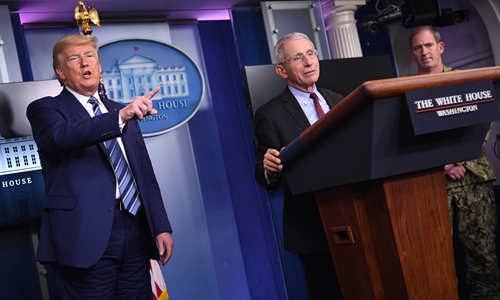HOME >> OPINION
Lack of US leadership can’t stall global virus fight
By Zhang Tengjun Source:Global Times Published: 2020/4/6 18:58:40

Director of the National Institute of Allergy and Infectious Diseases Anthony Fauci as US President Donald Trump dismisses a question during an unscheduled briefing after a Coronavirus Task Force meeting at the White House on Sunday, in Washington, DC. Photo: AFP
The novel coronavirus poses the most pressing challenge to the current US-led international order. The US is suffering the most serious public health crisis in a century. In face of the pandemic, the Western world, headed by the US, has not only failed to curb the spread of the virus, it has failed to demonstrate international leadership. The "Westlessness" discussed at the Munich Security Conference in February is once again being highlighted.The pandemic has thrown the international order into uncertainty, and the US is playing a negative role. Even though the country has the highest number of confirmed cases, the Trump administration continues to pursue anti-globalization, and seems to be trying to politicize the virus-caused havoc and shirk its international responsibility.
The Trump administration is facing three leadership crises. First, the US government is ill-equipped to handle the domestic situations. In the early days of the outbreak, it downplayed the severity of the disease and wasted two precious months it could have used to prepare. As a result, massive outbreaks rage through the nation, triggering a public health disaster. The Boston Globe may be right to say Trump has "blood on his hands."
Second, the US has turned a blind eye to its Western allies. When the outbreaks in Europe continued to worsen, instead of offering assistance, the Trump administration suspended flights and personnel exchanges. Such behavior goes against the US' commitment to its allies and erodes its leadership.
Third, the US has made little contribution to the global fight against COVID-19. Global cooperation is the only way to overcome the current difficulties. However, the US still pursues unilateralism and protectionism. Without providing any substantial help, the US even smeared China's support of other countries for political purposes.
The performance of the Trump administration during the pandemic once again demonstrates the diplomatic philosophy of "America first," which sets domestic affairs as the country's top priority and all actions basically need to serve the political goal of re-election. Trump hopes to obtain as much political benefit as possible during the election year. Thus, he shifts the blame to the Democratic Party and the media, and turns a deaf ear to the requests for help from Blue states like New York and California.
"America first" also means no country is allowed to challenge the US' leadership. During the pandemic the US has shown little interest in international cooperation. This does not mean the US will do nothing. Instead, it is doing everything to prevent any other country from becoming a leader in the global war against the COVID-19. What is more dangerous is that the Trump administration is attempting to turn the fight against the virus into a geopolitical and ideological competition. Trump called the coronavirus the "Chinese virus," while waging a public opinion war against China. The US government slandered China's political system and foreign aid. It is clear that the US is using the outbreak as a strategy to undermine China's image.
Individualism is rooted in the modern international system, which originated from the Peace Treaty of Westphalia of 1648. In peacetime, Western countries talk about global governance and cooperation. However, in times of crisis, they always seek benefits for themselves at the expense of others. As a result, conflicts and wars never stop, and world prosperity and stability constantly face serious challenges. Basically, the Western world has been indulged in the concept of zero-sum game, and "America first" is the new manifestation.
The international community has profoundly realized "American first" does great harm to the international system. Since Trump came into office, the US has put its own interests above those of the world and frequently damaged legitimacy and representativeness of the existing international mechanisms. Now, the current global governance system is in the most vulnerable period since its establishment.
The virus knows no borders or ideology. Solidarity and cooperation are the only way to survive the disease. Fortunately for the world, many countries have turned to China instead of the US for help, and China has given active responses, demonstrating its responsibility as a big power. The international community should unite to win this battle together. The absence of US' leadership does not amount to the end of the world.
The author is an assistant research fellow at the China Institute of International Studies. opinion@globaltimes.com.cn
Posted in: VIEWPOINT